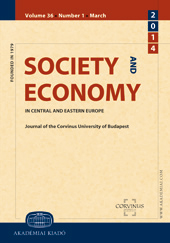Comparative Economics and European Integration Convergence and Divergence in the European Union and the Effects of Anti-Crisis Policies
Comparative Economics and European Integration Convergence and Divergence in the European Union and the Effects of Anti-Crisis Policies
Author(s): Bruno DallagoSubject(s): Supranational / Global Economy, Economic policy, Economic development, EU-Accession / EU-DEvelopment, EU-Legislation
Published by: Akadémiai Kiadó
Keywords: European Union; convergence; New Comparative Economics; Varieties of Capitalism;
Summary/Abstract: Transformation processes in Central and Eastern Europe and deep economic reforms in China and other emerging countries did not end the variety of economic systems. Various brands of comparative economics have shown this variety in both theory and different countries. An increasingly important form of this variety concerns the process of European integration. Systemic differences within the European Union are the source of difficulties and tensions, of a European conundrum that appears in different forms and ways and that make the sustainability and progress of integration difficult. This article looks at the logic of and proposals by the “New Comparative Economics” and the “Variety of Capitalisms” literature to find an explanation to the problems and difficulties that the European integration is meeting, going beyond the standard technical explanations based on European convergence criteria. It finds that both theories, although important and useful for contributing to solving the European conundrum, do not account sufficiently for the novelty and the complexity of European integration.
Journal: Society and Economy. In Central and Eastern Europe ǀ Journal of the Corvinus University of Budapest
- Issue Year: 39/2017
- Issue No: 3
- Page Range: 321-348
- Page Count: 28
- Language: English

